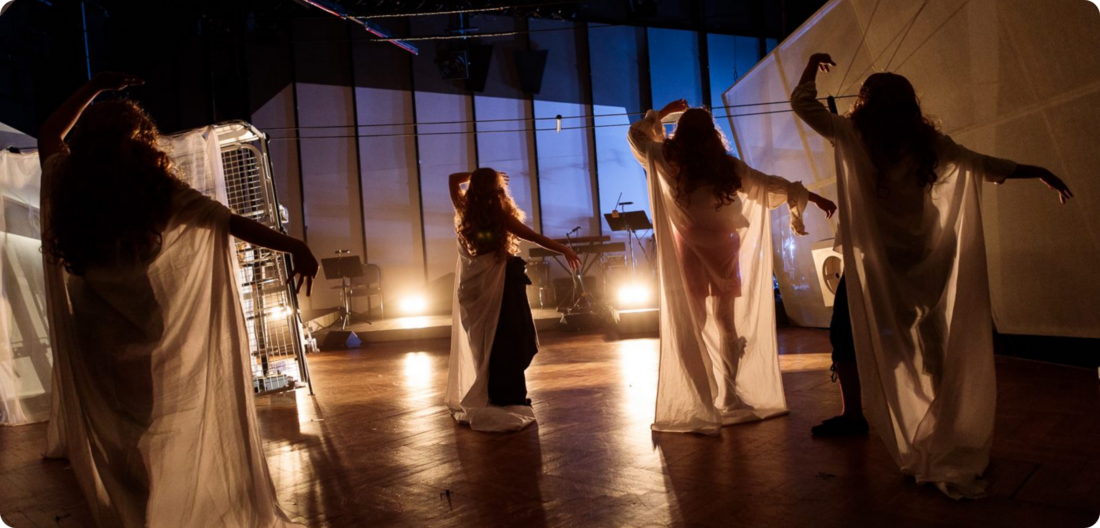
What is behind the NeuköllnER Oper?
- unique production house for world premieres: Music theater of all and between all genres in the coexistence of classical and popular music
- a theater with a soft spot for what surrounds us: Neukölln, Berlin, Germany and the world
- intelligent play with traditions, forms and good humor
- Pieces for a broad audience beyond fashionable niches and self-referential discourses
- international projects and co-productions with invitations for guest performances
- Festivals for European Music Theater
- last but not least, a training generator: for singers, composers, authors and directors, in cooperation with the UdK Berlin and the HfM Hanns Eisler, with the Berlin Opera Prize and various initiatives in cultural education.
There were times, after all, when opera, this great art form, attracted, moved and thrilled people from all walks of life. Be it in the “Beggar’s Opera” by Gay and Pepusch, the “Magic Flute” by Mozart and Schickaneder or the plays of Kurt Weill and his authors. In this tradition we see the art-work “opera”, in this sense the stylistically diverse theater-creators of the Neuköllner Opera combine to bring our life here and now on stage – as emotional, contradictory, complex, sometimes ugly and beautiful to cry about as it is in reality.
And we do that with all our heart and soul – sending new plays and fabric into the world!
For an open, constantly changing, livable society needs a cosmopolitan, curious and undogmatic playing and mirroring surface – also and especially in musical theater!
Only what is sustainably promoted, developed and actually tried out on stage can become good. To this end, we invite and offer nationwide unique production opportunities in the field of musical theater. Essential opportunities, therefore, for young composers, authors and theater creators with different artistic and biographical backgrounds, in a lively exchange with a multi-layered audience. This promotes openness and a socially relevant position – and thus also the rejection of a primarily academic-interested so-called contemporary music theater.
Our present is full of music and stories, in constant motion and evolution. Whether that’s the story of the “blond ghost from the Kudamm” STELLA (in the multi-award-winning musical by Peter Lund and Wolfgang Böhmer, the wild musical “drug trip” about a youth in Saxony at 9 DAYS WATCH with the VKKO, the passionate PASSION of GIOVANNI – a collaboration between award-winning director Ulrike Schwab and the STEGREIF. orchestra, – or DER MANN DER SICH BEETHOVEN NANNTE by the author team Moritz Rinke/Mathias Schönsee and Trickster Orchestra: These productions are representative of the diversity of our artists, genres and musical styles between musicals, opera and operetta adaptations, new compositions or crossover formats, for example with puppeteers like Suse Wächter, ensembles like leitundlause, Hauen und Stechen, Balletto civile or the dancers around Christopher Roman, soon with MEXICO AURA at the Humboldtforum.
But above all, our interest is in the future as the applied present, and thus in scouting with passion: we need new talent! They want to be found and nurtured – more about that at FUTURE.
Organizationally, the Neuköllner Opera is a private theater that receives funding through the Berlin Senate’s conceptual funding program and is also subsidized on a project-by-project basis by GASAG, the Capital Cultural Fund, the German Federal Cultural Foundation and other sponsors.
History
The Neuköllner Oper was founded by the composer and church musician Winfried Radeke. In the early days, the repertoire included plays that had not been given at all or had been given in an unquestioned form at Berlin’s major houses, such as The Emperor of Atlantis by Viktor Ullmann or The Nightjar by Boris Blacher, as well as world premieres such as The Birds after Aristophanes (text/music: Winfried Radeke).
In 1996, Winfried Radeke brought director and author Peter Lund on board as artistic director. With works such as The Miracle of Neukölln, Babytalk, Parents’ Night or Stella, he also made the house internationally known as a trendsetter in the field of new German musicals.
Peter Lund was succeeded in 2004 by dramaturge and author Bernhard Glocksin, who is committed to opening up the house to other styles of performance, a radical questioning of the opera repertoire, collaboration with leading ensembles (such as the STEGREIF.orchester, VKKO, Trickster Orchestra, and others) and an international orientation of the house.
Today, the Neukölln Opera is led by a three-member directorate (Andreas Altenhof, Bernhard Glocksin, Laura Hörold) and presents between 10-14 productions per year in a variety of formats – with 6-10 world premieres as well as revivals of successful productions, it offers a diverse, even more extensive range than that of many a municipal or state opera house.
Not least because of its numerous collaborations (including with the Musical/Show course of study at the UdK Berlin since its founding in 1997) and author competitions (Berlin Opera Prize – endowed by GASAG, also since 1997, the Zaimoglu Authors’ Academy and other workshop formats), the Neukölln Opera is considered one of the leading anchor institutions in Berlin’s cultural landscape.
The three previous artistic directors describe here their view of our house (written up on the occasion of its 40th birthday in November 2017).